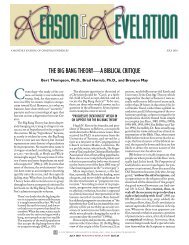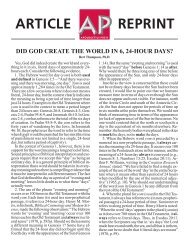The Many Faces, and Causes, of Unbelief - Apologetics Press
The Many Faces, and Causes, of Unbelief - Apologetics Press
The Many Faces, and Causes, of Unbelief - Apologetics Press
You also want an ePaper? Increase the reach of your titles
YUMPU automatically turns print PDFs into web optimized ePapers that Google loves.
A good example <strong>of</strong> this point would be the late evolutionist<br />
<strong>and</strong> atheist, Isaac Asimov, who once admitted quite bluntly:<br />
“Emotionally, I am an atheist. I don’t have the evidence to<br />
prove that God doesn’t exist, but I so strongly suspect he<br />
doesn’t that I don’t want to waste my time” (1982, 2[2]:9). Such<br />
a boast is easy enough to underst<strong>and</strong>, <strong>and</strong> requires no additional<br />
explanation. Yes, Dr. Asimov was indeed a committed<br />
atheist. However, he did not hold this view because he was<br />
able to <strong>of</strong>fer adequate, legitimate reasons to justify his unbelief.<br />
Rather, his world view was an emotional response that<br />
resulted from his personal freedom <strong>of</strong> choice. <strong>The</strong> fact remains<br />
that after everything is said <strong>and</strong> done, the atheist’s first<br />
option—disproving the theist’s evidence—is a difficult challenge<br />
that many choose not to accept.<br />
What, then, about option number two—providing, with attending<br />
evidence, a belief system that is a “reasonable alternative”?<br />
That, too, apparently is beyond the pale <strong>of</strong> atheism.<br />
In 1989, Richard Dawkins, renowned atheist <strong>and</strong> evolutionist<br />
<strong>of</strong> Oxford University, released the second edition <strong>of</strong> his<br />
book, <strong>The</strong> Selfish Gene in which he discussed at great length<br />
the gene’s role in the naturalistic process <strong>of</strong> “survival <strong>of</strong> the<br />
fittest.” Dawkins admitted that, according to the evolutionary<br />
paradigm, genes are “selfish” because they will do whatever<br />
it takes to ensure that the individual in which they are<br />
stored produces additional copies <strong>of</strong> the genes. In commenting<br />
on the effects <strong>of</strong> such a concept on society as a whole, Dr.<br />
Dawkins lamented: “My own feeling is that a human society<br />
based simply on the gene’s law <strong>of</strong> universal ruthlessness would<br />
be a very nasty society in which to live” (1989b, p. 3, emp.<br />
added).<br />
Michael Ruse, a Canadian philosopher, <strong>and</strong> Edward O.<br />
Wilson, a Harvard entomologist, had made the same point<br />
four years earlier when they wrote under the title <strong>of</strong> “Evolution<br />
<strong>and</strong> Ethics”:<br />
Morality, or more strictly our belief in morality, is<br />
merely an adaptation put in place to further our<br />
reproductive ends.... Ethics is seen to have a solid<br />
-14

















